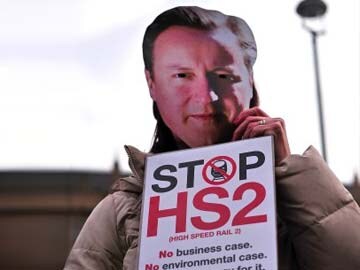
A protester wearing a mask depicting British Prime Minister David Cameron, demonstrates in central London, on November 25, 2013, against a proposed High Speed 2 (HS2) rail line
London:
The British government on Monday published a bill paving the way for an ambitious new high-speed railway, although concerns about its cost, usefulness and environmental impact may still scupper the plan.
The 50-billion pound (59-billion-euro, $80-billion) High Speed 2 (HS2) north-south line across England is the country's biggest infrastructure project for 30 years and is planned to be built in two stages from 2016, completing in 2033.
Ministers say the line is vital for economic growth, easing congestion and boosting business by improving links between London and the cities of Birmingham, Manchester and Leeds.
But critics say it will leave an ugly scar on the landscape and question whether it is worth the huge budget at a time when public spending is being tightly controlled.
The size of the bill published on Monday is evidence of the complexity of the project, comprising 300-odd pages of legislation and another 49,000 detailing the environmental impact of the line.
Members of the public will now have at least eight weeks to comment before the law-makers debate the proposals, which include plans to plant two million trees to reduce the noise of the trains and hide the line.
"The bill will give us the powers we need to get the railway built and start delivering the extra room on our railways that this country so desperately needs," transport minister Patrick McLoughlin said.
"It will also start the process of rebalancing the economy and bringing our great cities closer together."
England may be the birthplace of railways but with only one high-speed line between London and the Channel Tunnel on the south coast, it lags behind countries such as Japan and France.
There is broad political and business support for the new line, which was conceived by the former Labour government and is backed by Prime Minister David Cameron's coalition.
But Labour hinted recently that it might not support the project if costs go up- raising the prospect they might pull the plug if they win the next election in 2015.
The 50-billion pound (59-billion-euro, $80-billion) High Speed 2 (HS2) north-south line across England is the country's biggest infrastructure project for 30 years and is planned to be built in two stages from 2016, completing in 2033.
Ministers say the line is vital for economic growth, easing congestion and boosting business by improving links between London and the cities of Birmingham, Manchester and Leeds.
But critics say it will leave an ugly scar on the landscape and question whether it is worth the huge budget at a time when public spending is being tightly controlled.
The size of the bill published on Monday is evidence of the complexity of the project, comprising 300-odd pages of legislation and another 49,000 detailing the environmental impact of the line.
Members of the public will now have at least eight weeks to comment before the law-makers debate the proposals, which include plans to plant two million trees to reduce the noise of the trains and hide the line.
"The bill will give us the powers we need to get the railway built and start delivering the extra room on our railways that this country so desperately needs," transport minister Patrick McLoughlin said.
"It will also start the process of rebalancing the economy and bringing our great cities closer together."
England may be the birthplace of railways but with only one high-speed line between London and the Channel Tunnel on the south coast, it lags behind countries such as Japan and France.
There is broad political and business support for the new line, which was conceived by the former Labour government and is backed by Prime Minister David Cameron's coalition.
But Labour hinted recently that it might not support the project if costs go up- raising the prospect they might pull the plug if they win the next election in 2015.
Track Latest News Live on NDTV.com and get news updates from India and around the world

